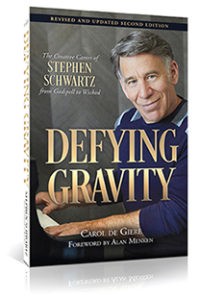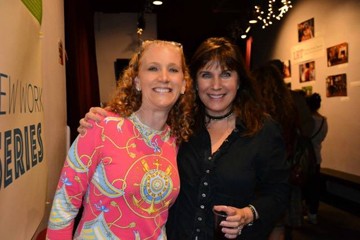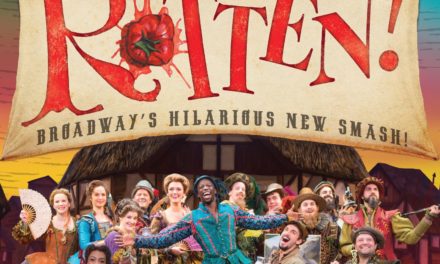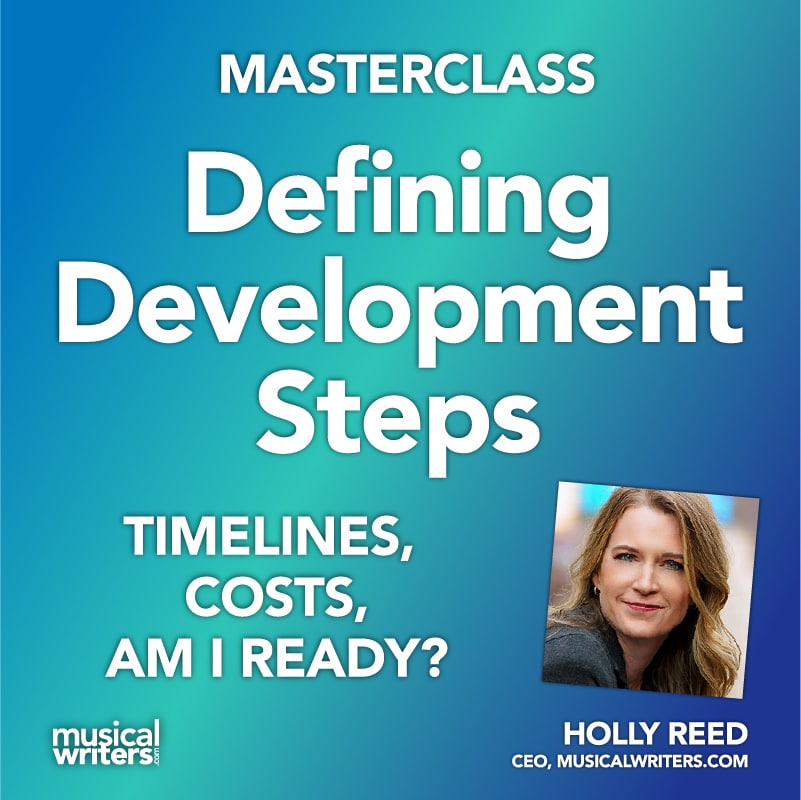Many Drafts…. It’s All Part of a Musical Writer’s Job
Anyone creating a new musical needs a strategy or attitude to carry them through what may seem like an endless revision process. Here are are a few exchanges I had with Stephen Schwartz (known especially for Wicked, Pippin, Godspell) about songwriting and making it through the writing, testing, and rewriting phases of musical development.
Surviving Tests and Endless Song Rewrites
Carol de Giere: Writers have to be willing to create bad drafts. But then, in your life, when you write a bad [early] draft, how do you feel about yourself?

Lyricist Susan Birkenhead and composer-lyricist Stephen Schwartz at the 2016 ASCAP Musical Theatre Workshop in NYC, discussing recommended song rewrites for a new musical. Photo by Carol de Giere.
Stephen Schwartz: I have some sort of specific goal in mind for whatever it is I’m doing. And everything on the road to that goal is process. I don’t really worry about how long it takes to get there or how many stages or crappy stuff it has to go through. That’s just process, and you’re just on the way to the goal. And sometimes I’ve felt that I was there and then discovered by getting feedback that I wasn’t, and initially sometimes that’s very disheartening and exhausting; wearying.
de Giere: But doesn’t it necessarily lead to self-doubt?
Schwartz: I think that we all have self-doubt, but you just have to overcome it. Sure, sometimes I’ve had huge bouts of self-doubt. I mean, after failures, how could you not have self-doubt? Working, The Baker’s Wife, Children of Eden—you can’t have bigger failures than that and yet people saw in them something worth pursuing that made me re-believe in them. In all three cases, there was at least one person who said don’t let this disappear, and all three of those pursuits have been rewarded [the shows are all successfully licensed]. I also have an incredibly strong personal support system, which is very helpful. [Quoted in Defying Gravity]
Knowing When a Song is Ready
From an unpublished interview in 2015.
de Giere: How do you know when a song is ready for a reading or a show? Do you have a mental checklist that you go over, checking to see if you achieved your objectives?
Schwartz: That’s really instinctive. A lot of times I don’t know if a song is ready, which is one reason we do readings. Readings take a lot of the pressure off because I feel, well I’ll just write something and if it works, great, and if it doesn’t work, then I’ll learn something about why it doesn’t work and that will help me to do the revision or the new song, depending on how much it doesn’t work. I have a clear objective as to what is the storytelling job of the song: where does this start in terms of the storytelling and the characters and where does it end? That needs to be very clear. As Alan Menken says, when people ask which comes first, the music or the lyrics, he says ‘the assignment.’ Meaning you have to start by being clear on what is your assignment for this particular song.
de Giere: So you wouldn’t call it a mental checklist really?
Schwartz: No, I wouldn’t. It’s always instinct. But what is challenging is having a clear objective as the writer, and then becoming the character and not having the work feel as if the character is being manipulated in order to serve the writer’s objectives – that the character is naturally and organically coming to whatever the storytelling end is, as opposed to feeling like a little puppet. I frequently find that a challenge. I do try to evaluate as I go along if each number feels organic in that way. So I suppose there’s a kind of check list there. But it’s not as if I finish a song and go, did I do this, check, did I do that, check. It’s not that kind of process.
For more about the creative process for Stephen Schwartz and his colleagues, be sure to read Defying Gravity: The Creative Career of Stephen Schwartz, from Godspell to Wicked



















